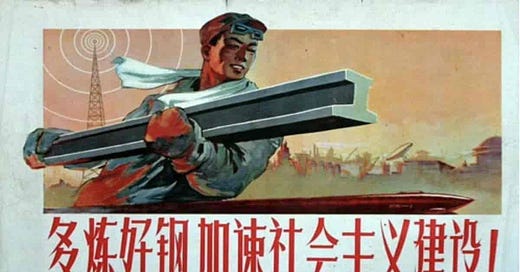The Great Leap Reconsidered, Part One
"Otherwise, the Chinese nation will disappoint the world".
The ‘Reconsidered’ series will re-examine seminal events in PRC history. Bite-size episodes. Free to all. I hope you find them worth sharing with interested friends.
By 1958, communications were still primitive, the government was still inexperienced, goal-setting was amateurish, and Beijing’s capacity to coordinate national programs was crude, yet Mao was under relentless pressure. He had doubled food production and halved the death rate, but the birthrate had doubled and he was racing to modernize the country while under foreign embargoes and threats of a nuclear attack.
As a matter of survival, he insisted, China must develop agriculture, industry and worker’s consciousness simultaneously: “In man, motivation derives from consciousness, which, in turn, comes from socialization. Motivation is the source of moral energies like dedication, devotion, determination, faith, frugality, diligence, and simplicity. Consciousness and inspiration reinforce each other and can be transformed, one into the other”. China could not afford to walk. Even to survive, it must take a giant leap.
Aware from childhood of the difficulties of depending on corrupt local officials, he wrote directly to local production teams and even work squads,
“I want to address a problem with our agriculture. Please ignore top-down crop targets and stick to what is feasible. Thirty percent, even sixty percent higher yield than last year would be excellent, but what’s the point of boasting about four hundred percent when that’s merely impossible? As for dense planting, let old, middle-aged, and younger farmers discuss it and decide it within your production teams. Save your food! Preserve it well, build a reserve for future emergencies. We can’t afford boasting or empty talk for at least ten years. Make high yields in small fields your immediate goal because mechanization will take at least ten years, so we must simply farm more acreage for the next three years. Plant on a larger scale. Set up research institutes for farming tools. Fertilizer is essential. Many lies are caused by pressure from superiors who boast and pressure those below them, and they’re difficult to deal with. Speak the truth. Promise only the number you can deliver. Don’t pretend you can ‘do it with effort’ when you actually can’t. Just report how much the harvest really is. If the reality is not as low as I predict–if a real, high outcome makes me look like an out-of-touch conservative–I’ll thank heaven and earth”. – Mao Zedong, Chairman.
Innovative and enormously ambitious
Mao’s Great Leap would teach peasants industrial production while simultaneously overcoming famine and threats of foreign aggression. Communalized peasants and workers would share responsibilities. Communal childcare and communal kitchens would free women to join the workforce and, by distributing development throughout the countryside, they would make centralized, expensive, nationwide transportation infrastructure unnecessary.
Peasants ‘walking on two legs’ would both farm and develop light industry while erecting dikes, building dams, and expanding irrigation. Increased agricultural productivity would free up labor for local manufacturing, and, in the absence of foreign capital, labor-intensive rural industries would meet local needs. Locally produced cement would build local dams that would water soil enriched with locally made fertilizer through locally made irrigation equipment. After generations of semi-starvation the nation was giddily optimistic, and peasants presumed an unlimited supply of government-guaranteed food.
Communal dining rooms began providing such abundant meals that farmers said they had never eaten better in their lives. Families depleted their grain stores, slaughtered their animals and held feasts. Said one report, “Instead of transferring draft animals to the ownership of the collectives, peasants slaughtered them to keep the meat and hide … estimates suggest that animal loss during the movement was almost ten million head. Grain output dropped by seven percent due to lower animal inputs and lower productivity”.
To be continued..





What is the source of the quote “In man, motivation derives from consciousness, which, in turn, comes from socialization. Motivation is the source of moral energies like dedication, devotion, determination, faith, frugality, diligence, and simplicity. Consciousness and inspiration reinforce each other and can be transformed, one into the other”, please?